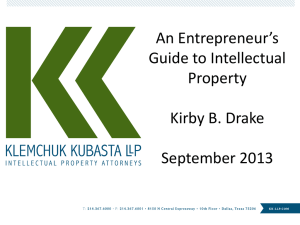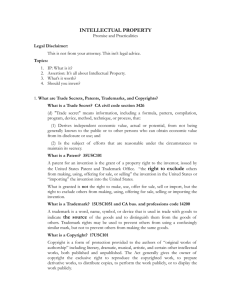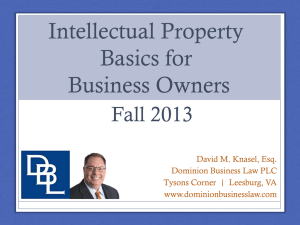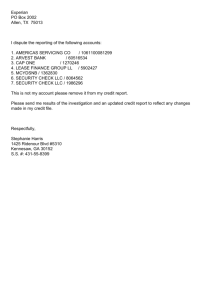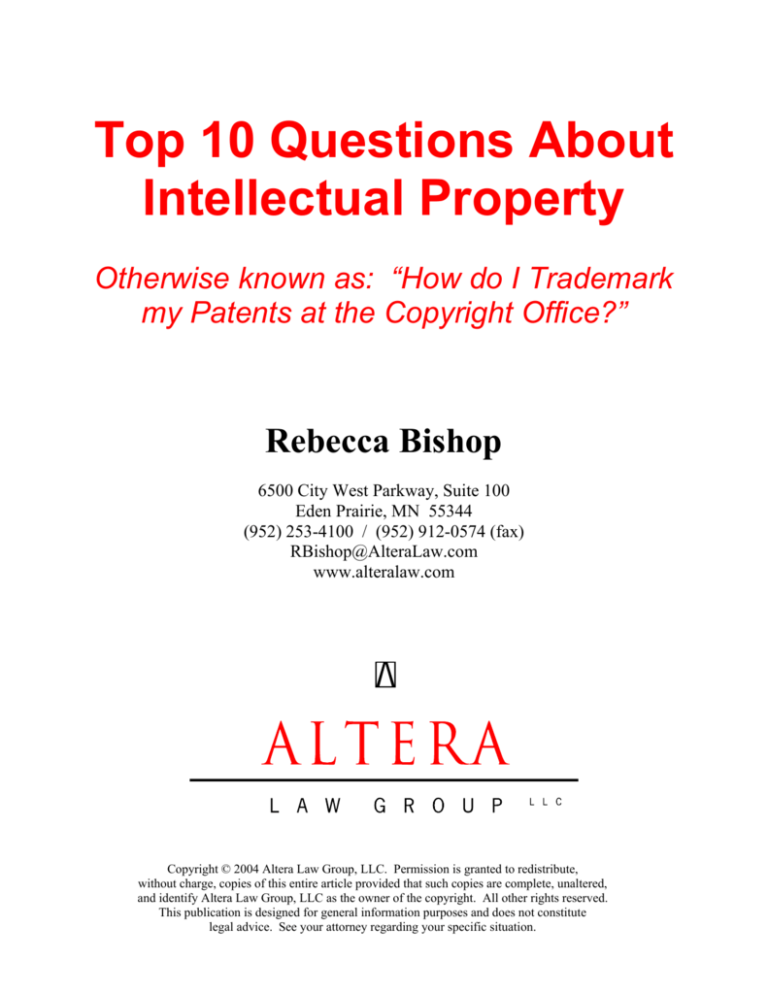
Top 10 Questions About
Intellectual Property
Otherwise known as: “How do I Trademark
my Patents at the Copyright Office?”
Rebecca Bishop
6500 City West Parkway, Suite 100
Eden Prairie, MN 55344
(952) 253-4100 / (952) 912-0574 (fax)
RBishop@AlteraLaw.com
www.alteralaw.com
Copyright © 2004 Altera Law Group, LLC. Permission is granted to redistribute,
without charge, copies of this entire article provided that such copies are complete, unaltered,
and identify Altera Law Group, LLC as the owner of the copyright. All other rights reserved.
This publication is designed for general information purposes and does not constitute
legal advice. See your attorney regarding your specific situation.
Top 10 Questions About Intellectual
Property
Otherwise known as:
“How do I Trademark my Patents at the Copyright Office?”
1.
What is the difference between trademarks, patents and
copyrights?
Although trademarks, patents and copyrights all fall under the general umbrella
of Intellectual Property, they are actually quite different types of protection. Generally,
trademarks protect the name of a product or service, patents protect inventions or
unique methods of doing business, and copyrights protect the expression of an idea,
such as a song, poem or painting. More specific differences are listed below:
a. TRADEMARKS
Definition: A trademark is any word, phrase, symbol, design, color, scent,
sound, etc., or any combination thereof, that identifies and distinguishes the
source of the goods of one entity from those of others. A service mark is the
same as a trademark, except that it identifies the source of a service rather
than goods.
Duration: Just like a diamond, a mark is forever… If properly used and
cared for, both common law trademarks and federal registrations will continue
in perpetuity.
Examples: SLOGAN = “Home of the Whopper” for Burger King or “The
Taste of a New Generation” for Pepsi; LOGO = Red Bullseye for Target or
Red / White Checkerboard for Purina; SOUND = NBC chimes or Intel’s 4 note
2
Copyright © 2004 Altera Law Group, LLC. Permission is granted to redistribute,
without charge, copies of this entire article provided that such copies are complete, unaltered,
and identify Altera Law Group, LLC as the owner of the copyright. All other rights reserved.
This publication is designed for general information purposes and does not constitute
legal advice. See your attorney regarding your specific situation.
succession; SMELL = scented embroidery thread or scented gasoline;
COLOR = pink for Owens-Corning insulation; DESIGN = shape of the Coca
Cola bottle; MOVEMENT = poking the tummy of the Pillsbury Dough Boy
b. PATENTS
Definition: A patent is a property right granted by the U.S. Government to an
inventor “to exclude others from making, using, offering for sale, or selling the
invention throughout the United States or importing the invention into the
United States” for a limited time in exchange for public disclosure of the
invention when the patent is granted.
Types:
*Utility patent – a new, useful and non-obvious invention, or any new,
useful and non-obvious improvements thereon. A utility patent protects
functional aspects of an invention and, once issued, usually lasts for 20
years from its filing date.
*Design patent - A design patent protects the decorative aspects of an
invention for a term of 14 years. Design patents should be pursued if the
essence of an invention is its appearance, or if the final version has a
unique look.
*Business Method patent - a business-method patent is just like any other
patent, except the subject matter happens to relate in some way to a
method of doing business, sometimes involving computer interface.
c. COPYRIGHT
Definition A copyright is a form of protection to the authors of “original works
of authorship,” including literary, dramatic, musical, artistic, and certain other
intellectual works. This protection is available to both published and
3
Copyright © 2004 Altera Law Group, LLC. Permission is granted to redistribute,
without charge, copies of this entire article provided that such copies are complete, unaltered,
and identify Altera Law Group, LLC as the owner of the copyright. All other rights reserved.
This publication is designed for general information purposes and does not constitute
legal advice. See your attorney regarding your specific situation.
unpublished works. The U.S. Copyright laws generally give the owner of
copyright the exclusive right to do and to authorize others to do the following:
•
To reproduce the work in copies or phonorecords;
•
To prepare derivative works based upon the work;
•
To distribute copies or phonorecords of the work to the public by
sale or other transfer of ownership, or by rental, lease, or lending;
•
To perform the work publicly, in the case of literary, musical,
dramatic, and choreographic works, pantomimes, and motion pictures
and other audiovisual works;
•
To display the copyrighted work publicly, in the case of literary,
musical, dramatic, and choreographic works, pantomimes, and
pictorial, graphic, or sculptural works, including the individual images of
a motion picture or other audiovisual work; and
•
In the case of sound recordings, to perform the work publicly by
means of a digital audio transmission.
DURATION: A work that is created (fixed in tangible form for the first time)
on or after January 1, 1978, is automatically protected from the moment of its
creation* and is ordinarily given a term enduring for the author's life plus an
additional 70 years after the author's death. In the case of "a joint work
prepared by two or more authors who did not work for hire," the term lasts for
70 years after the last surviving author's death. For works made for hire, and
for anonymous and pseudonymous works (unless the author's identity is
revealed in Copyright Office records), the duration of copyright will be 95
years from publication or 120 years from creation, whichever is shorter.
* It is important to note that in order to collect damages in a copyright
infringement lawsuit, you must own a federal copyright registration.
4
Copyright © 2004 Altera Law Group, LLC. Permission is granted to redistribute,
without charge, copies of this entire article provided that such copies are complete, unaltered,
and identify Altera Law Group, LLC as the owner of the copyright. All other rights reserved.
This publication is designed for general information purposes and does not constitute
legal advice. See your attorney regarding your specific situation.
2.
Do I have to get a federal registration for my trademarks,
copyrights and patents? If not, why should I bother?
a. TRADEMARK = once you use a trademark in interstate commerce, you
obtain “common law rights,” which include the right to prevent others from
using similar marks on similar goods (i.e., trademark infringement). So, you
do not have to get a federal registration for your trademarks, but it is a very
good idea because a registration:
1.
Puts others on notice of your mark
2.
Lets the government do some of your enforcement work for you
3.
Allows for the presumption of validity, ownership, right to use, etc.
4.
Allows for federal court jurisdiction
b. COPYRIGHT = once pen is set to paper, brush to canvas, notes to sheet
music, etc., a copyright is born and will live for the number of years set out in
the copyright laws. Again, are not required to get a federal registration, but if
you find someone is infringing your copyright, you must file a federal
application before you can sue in court and you will lose the right to any
damages sustained prior to your registration date.
c. PATENT = there is no such thing as a common law patent – you MUST file a
federal application for protection. It is also important to note that once you
discuss the subject matter of a patent with the public, you only have 1 year to
file the application (known as the “bar date”) in the United States. In some
other countries, patent rights are lost immediately upon disclosure of the
5
Copyright © 2004 Altera Law Group, LLC. Permission is granted to redistribute,
without charge, copies of this entire article provided that such copies are complete, unaltered,
and identify Altera Law Group, LLC as the owner of the copyright. All other rights reserved.
This publication is designed for general information purposes and does not constitute
legal advice. See your attorney regarding your specific situation.
subject matter, so it is always a good idea to consider getting patent
applications on file before making disclosures of potentially patentable subject
matter.
3.
What is the cost benefit of getting a federal registration?
Federal copyright registrations are the least expensive to secure, followed by
federal trademark registrations, and finally the most complex component of IP
protection, U.S. patents. While it is sometimes possible to file pro se (by
yourself), IP law is quite complex, and most people engage an attorney to
interface with the Patent and Trademark Office on their behalf. Without
experienced counsel, you may inadvertently give up important rights and not
discover the problem until it is too late to correct, if correction is even possible.
Most attorneys in this area will provide you with a budget after understanding the
nature of your IP rights. In that way, you will know what the initial process costs
up front.
4. How long does it take to get a federal registration?
a. COPYRIGHT = approximately one month
b. TRADEMARK = approximately two years, though rights are established,
in part, as of the date the application is filed
c. PATENT = approximately two years, though the publication date
establishes some rights
5.
What do the TM, ®, © and “Pat. Pend.” symbols mean?
When can I use them? Should I use them?
6
Copyright © 2004 Altera Law Group, LLC. Permission is granted to redistribute,
without charge, copies of this entire article provided that such copies are complete, unaltered,
and identify Altera Law Group, LLC as the owner of the copyright. All other rights reserved.
This publication is designed for general information purposes and does not constitute
legal advice. See your attorney regarding your specific situation.
TM = common law trademark (see also SM for common law service mark). Can
be used ANY TIME, regardless of whether you have filed a federal trademark
application. Lets the world know that you claim that material as a valid
trademark.
® = federally registered trademark or service mark. You can only use this
AFTER you have received a U.S. federal registration. The trademark laws of
foreign countries differ, however, so it is important to consult an attorney before
using this designation on goods that will be sent outside of the U.S.
© = copyright designation, which can be used any time, regardless of whether a
federal registration has been secured. In fact, it is ALWAYS a good idea to
include this symbol, along with the year the copyright was created and the name
of the individual or entity responsible for its creation at a conspicuous location on
the copyrighted material.
Pat. Pend. = indicates that you have filed a federal application for a patent with
the U.S. Patent and Trademark Office. Again, the laws of foreign countries differ,
so consult an attorney before using this designation on goods that will be sent
outside of the U.S. If all goes well and your patent “issues,” you should put a
notice of the U.S. patent number on the patented item, such as “U.S. Patent No.
XXX,XXX,XXX.”
6.
I am in the process of picking a name for my new
business – what should I keep in mind to pick a good,
protectable name?
7
Copyright © 2004 Altera Law Group, LLC. Permission is granted to redistribute,
without charge, copies of this entire article provided that such copies are complete, unaltered,
and identify Altera Law Group, LLC as the owner of the copyright. All other rights reserved.
This publication is designed for general information purposes and does not constitute
legal advice. See your attorney regarding your specific situation.
Good business names and trademarks are those that are considered “strong”
under trademark law. The strongest marks are coined words and the
weakest are words that merely describe or are the generic name for your
goods and services.
Strong
Weak
Coined
Words
Real Word
Suggestive
Descriptive
Arbitrary
Usage
Merely
Descriptive
Generic
*NOTE: The above-identified trademarks are the Intellectual Property of their respective owners.
As a general rule, the stronger the trademark, the easier it will be to stop others
from infringing activities. In addition, weak trademarks are likely to be popular
amongst your competitors, given their descriptive nature.
Putting these two principles together, selecting a weak mark will likely put you in
a situation where your competitors are using very similar marks to sell similar
goods, and you cannot do anything to stop it. For example, trademark law allows
the following to co-exist, despite their similar names:
8
Copyright © 2004 Altera Law Group, LLC. Permission is granted to redistribute,
without charge, copies of this entire article provided that such copies are complete, unaltered,
and identify Altera Law Group, LLC as the owner of the copyright. All other rights reserved.
This publication is designed for general information purposes and does not constitute
legal advice. See your attorney regarding your specific situation.
*NOTE: The above-identified trademarks are the Intellectual Property of their respective owners.
7. I often find good pictures or quotes on the Internet – can I
use them in my own marketing materials? Does it make a
difference if I make sure to give credit to the source? Is it
a problem if I’m using “clip art” for my business logo?
It is generally a bad idea to use material on the Internet for your own business
purposes – at least not without permission. Just because someone publishes
a picture, story, quote, etc. on the Internet does not mean it is free for the
taking (even if the appropriate TM, SM ® or © designations are not used).
Even giving the author credit will not save you – you can’t avoid copyright or
trademark infringement by being nice.
That being said, there are a number of web sites with free clip art that you
may use however you wish. Keep in mind that everyone else can use this
clip art as well, which means that you are not building recognition or good will
by using these symbols in the promotion of your business. It is ALWAYS a
good idea to avoid using clip art in your business logo.
9
Copyright © 2004 Altera Law Group, LLC. Permission is granted to redistribute,
without charge, copies of this entire article provided that such copies are complete, unaltered,
and identify Altera Law Group, LLC as the owner of the copyright. All other rights reserved.
This publication is designed for general information purposes and does not constitute
legal advice. See your attorney regarding your specific situation.
8. Is there something special I should know if I do business
or sell goods outside of the United States?
The same Intellectual Property protection available in the United States is
generally available in other countries as well. It is often necessary and
advantageous, however, to own federal trademark or patent registrations in
the United States before applying for protection elsewhere. The rules in this
area tend to be specialized and complicated, and it is a good idea to consult
an IP attorney early in your business if you intend to do business
internationally. This is especially true of patents, as public disclosure before
filing may destroy, forever, your rights to file.
9. What is a trade secret?
A trade secret is anything in your business that you keep secret that your
competitors, if they knew the information, would be able to use it to their
economic advantage. Trade secret is a matter of state law, and the rules
about trade secrets in Minnesota are contained in the Minnesota statutes at
Chapter 325C. Trade secrets in Minnesota are broadly defined, and just
about anything can be covered. To qualify as a trade secret, you must keep
the information a secret. Manufacturing processes are often held as trade
secrets, and so is the formula for Coca-Cola®. Trade secret issues occur
most often with former employees. A common scenario with trade secrets
occurs when a sales person leaving one company takes a customer or
prospect list to a competitor. In such cases, the original company can obtain
an injunction to stop use of the customer list, and in some cases may also
receive money damages for the loss of the secret.
10
Copyright © 2004 Altera Law Group, LLC. Permission is granted to redistribute,
without charge, copies of this entire article provided that such copies are complete, unaltered,
and identify Altera Law Group, LLC as the owner of the copyright. All other rights reserved.
This publication is designed for general information purposes and does not constitute
legal advice. See your attorney regarding your specific situation.
10. I’m just not sure what kind of Intellectual Property I
might have – how do I find out?
The chances are VERY good that you have developed and own several forms
of IP in your business and you don’t even know it! The best way to find out is
to hire a reputable IP attorney to conduct an IP audit. This is a process
whereby you partner with your attorney to teach them your business, review
your marketing materials, discuss your business name and/or logo, and
examine your internal processes to make a comprehensive list of all IP you
have developed, and then determine the best and most efficient means for
protecting it. An IP audit can be an effective tool in all stages of a business
and is the most efficient means of ensuring you are protecting yourself
adequately in the area of Intellectual Property.
11
Copyright © 2004 Altera Law Group, LLC. Permission is granted to redistribute,
without charge, copies of this entire article provided that such copies are complete, unaltered,
and identify Altera Law Group, LLC as the owner of the copyright. All other rights reserved.
This publication is designed for general information purposes and does not constitute
legal advice. See your attorney regarding your specific situation.


